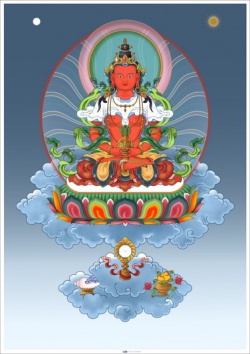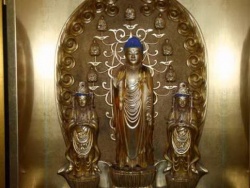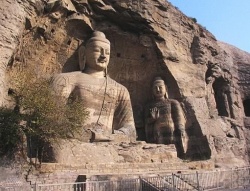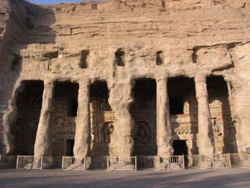The Forty-Eight Vows
forty-eight vows
[四十八願] (Jpn shijuhachi-gan )
The vows that Amida Buddha is said to have made while still engaged in Bodhisattva practice as Bodhisattva Dharma Treasury. They are listed in the Buddha Infinite Life Sutra. According to the Sutra, Bodhisattva Dharma Treasury wished to create a splendid Buddha land in which he would live after attaining Buddhahood. Under the guidance of The Buddha World Freedom King, he studied the characteristics of "the lands of two hundred ten million Buddhas" and then meditated for five Kalpas, pondering the features that should dignify his own Buddha land. After completing this Meditation, Bodhisattva Dharma Treasury made forty-eight vows concerning the characteristics of his Buddha land, thus ensuring its sublimity. For example, the first vow states, "If, after I attain Buddhahood, there are any beings of Hell, the realm of hungry spirits, or The Realm of Animals to be found in my land, then let me not attain supreme Enlightenment." Among these vows, the Eighteenth vow—that all who place their Trust in Amida Buddha will obtain Rebirth in the Pure land, excepting only those who commit the Five cardinal sins and those who slander the correct teaching—is the one most emphasized by the Pure land school.
Translated from Chinese by Hisao Inagaki
(1) If, when I attain Buddhahood, should there be in my land a Hell, a realm of hungry spirits or a realm of Animals, may I not attain perfect Enlightenment.
(2) If, when I attain Buddhahood, humans and devas in my land should after Death fall again into the three Evil realms, may I not attain perfect Enlightenment.
(3) If, when I attain Buddhahood, humans and devas in my land should not all be the colour of pure gold, may I not attain perfect Enlightenment.
(4) If, when I attain Buddhahood, humans and devas in my land should not all be of one appearance, and should there be any difference in Beauty, may I not attain perfect Enlightenment.
(5) If, when I attain Buddhahood, humans and devas in my land should not remember all their previous lives, not knowing at least the events which occurred during the previous hundred thousand kotis of nayutas of Kalpas, may I not attain perfect Enlightenment.
(6) If, when I attain Buddhahood, humans and devas in my land should not possess the divine Eye of seeing at least a hundred thousand kotis of nayutas of Buddha-lands, may I not attain perfect Enlightenment.
(7) If, when I attain Buddhahood, humans and devas in my land should not possess the divine ear of hearing the teachings of at least a hundred thousand kotis of nayutas of Buddhas and should not remember all of them, may I not attain perfect Enlightenment.
(8) If, when I attain Buddhahood, humans and devas in my land should not possess the faculty of knowing the thoughts of others, even those of all Sentient beings living in a hundred thousand kotis of nayutas of Buddha-lands, may I not attain perfect Enlightenment.
(9) If, when I attain Buddhahood, humans and devas in my land should not possess the supernatural Power of travelling anywhere in one instant, even beyond a hundred thousand kotis of nayutas of Buddha-lands, may I not attain perfect Enlightenment.
(10) If, when I attain Buddhahood, humans and devas in my land should give rise to thoughts of self-Attachment, may I not attain perfect Enlightenment.
(11) If, when I attain Buddhahood, humans and devas in my land should not dwell in the Definitely Assured State and unfailingly reach Nirvana, may I not attain perfect Enlightenment.
(12) If, when I attain Buddhahood, my Light should be limited, unable to illuminate even a hundred thousand kotis of nayutas of Buddha-lands, may I not attain perfect Enlightenment.
(13) If, when I attain Buddhahood, my Life-span should be limited, even to the extent of a hundred thousand kotis of nayutas of Kalpas, may I not attain perfect Enlightenment.
(14) If, when I attain Buddhahood, the number of the shravakas in my land could be known, even if all the beings and pratyekabuddhas living in this Universe of a thousand million worlds should count them during a hundred thousand Kalpas, may I not attain perfect Enlightenment.
(15) If, when I attain Buddhahood, humans and devas in my land should have limited Life-spans, except when they wish to shorten them in accordance with their previous vows, may I not attain perfect Enlightenment.
(16) If, when I attain Buddhahood, humans and devas in my land should even hear of any wrongdoing, may I not attain perfect Enlightenment.
(17) If, when I attain Buddhahood, innumerable Buddhas in the land of the ten directions should not all praise and glorify my Name, may I not attain perfect Enlightenment.
(18) If, when I attain Buddhahood, Sentient beings in the lands of the ten directions who sincerely and joyfully entrust themselves to me, aspire to be born in my land, and call my Name even ten times, should not be born there, may I not attain perfect Enlightenment. Excluded, however, are those who commit the five gravest offences and abuse the right Dharma.
(19) If, when I attain Buddhahood, Sentient beings in the lands of the ten directions, who awaken Aspiration for enlightenment, do various meritorious deeds and sincerely Desire to be born in my land, should not, at their Death, see me appear before them surrounded by a multitude of sages, may I not attain perfect Enlightenment.
(20) If, when I attain Buddhahood, Sentient beings in the lands of the ten directions who, having heard my Name, concentrate their thoughts on my land, do various meritorious deeds and sincerely transfer their merits towards my land with a Desire to be born there, should not eventually fulfil their aspiration, may I not attain perfect Enlightenment.
(21) If, when I attain Buddhahood, humans and devas in my land should not all be endowed with the thirty-two physical characteristics of a Great Man, may I not attain perfect Enlightenment.
(22) If, when I attain Buddhahood, Bodhisattvas in The Buddha-lands of other directions who visit my land should not ultimately and unfailingly reach the Stage of Becoming a Buddha after One More Life, may I not attain perfect Enlightenment. Excepted are those who wish to teach and guide Sentient beings in accordance with their original vows. For they wear the armour of great vows, accumulate merits, deliver all beings from birth-and-Death, visit Buddha-lands to perform the Bodhisattva practices, make offerings to Buddhas, Tathagatas, throughout the ten directions, enlighten uncountable Sentient beings as numerous as the sands of the River Ganges, and establish them in the highest, perfect Enlightenment. Such Bodhisattvas transcend the course of practice of the ordinary Bodhisattva stages and actually cultivate the virtues of Samantabhadra.
(23) If, when I attain Buddhahood, Bodhisattvas in my land, who would make offerings to Buddhas through my divine Power, should not be able to reach immeasurable and innumerable kotis of nayutas of Buddha-lands in the short time it takes to eat a meal, may I not attain perfect Enlightenment.
(24) If, when I attain Buddhahood, Bodhisattvas in my land should not be able, as they wish, to perform meritorious acts of worshipping the Buddhas with the offerings of their choice, may I not attain perfect Enlightenment.
(25) If, when I attain Buddhahood, Bodhisattvas in my land should not be able to expound the Dharma with the all-knowing Wisdom, may I not attain perfect Enlightenment.
(26) If, when I attain Buddhahood, there should be any Bodhisattva in my land not endowed with the Body of the Vajra-God Narayana, may I not attain perfect Enlightenment.
(27) If, when I attain Buddhahood, Sentient beings should be able, even with the divine Eye, to distinguish by name and calculate by number all the myriads of manifestations provided for the humans and devas in my land, which are glorious and resplendent and have exquisite details beyond description, may I not attain perfect Enlightenment.
(28) If, when I attain Buddhahood, Bodhisattvas in my land, even those with little store of Merit, should not be able to see the Bodhi-tree which has countless colours and is four million li in height, may I not attain perfect Enlightenment.
(29) If, when I attain Buddhahood, Bodhisattvas in my land should not acquire eloquence and Wisdom in upholding Sutras and reciting and expounding them, may I not attain perfect Enlightenment.
(30) If, when I attain Buddhahood, the Wisdom and eloquence of Bodhisattvas in my land should be limited, may I not attain perfect Enlightenment.
(31) If, when I attain Buddhahood, my land should not be resplendent, revealing in its Light all the immeasurable, innumerable and inconceivable Buddha-lands, like images reflected in a clear mirror, may I not attain perfect Enlightenment.
(32) If, when I attain Buddhahood, all the myriads of manifestations in my land, from the ground to the sky, such as palaces, pavilions, ponds, streams and trees, should not be composed both of countless treasures, which surpass in supreme excellence anything in the worlds of humans and devas, and of a hundred thousand kinds of aromatic wood, whose fragrance pervades all the worlds of the ten directions, causing all Bodhisattvas who sense it to perform Buddhist practices, then may I not attain perfect Enlightenment.
(33) If, when I attain Buddhahood, Sentient beings in the immeasurable and inconceivable Buddha-lands of the ten directions, who have been touched by my Light, should not feel peace and Happiness in their bodies and minds surpassing those of humans and devas, may I not attain perfect Enlightenment.
(34) If, when I attain Buddhahood, Sentient beings in the immeasurable and inconceivable Buddha-lands of the ten directions, who have heard my Name, should not gain the Bodhisattva's Insight into the non-arising of all dharmas and should not acquire various profound dharanis, may I not attain perfect Enlightenment.
(35) If, when I attain Buddhahood, women in the immeasurable and inconceivable Buddha-lands of the ten directions who, having heard my Name, rejoice in Faith, awaken Aspiration for enlightenment and wish to renounce womanhood, should after Death be reborn again as women, may I not attain perfect Enlightenment.
(36) If, when I attain Buddhahood, Bodhisattvas in the immeasurable and inconceivable Buddha-lands of the ten directions, who have heard my Name, should not, after the end of their lives, always perform sacred practices until they reach Buddhahood, may I not attain perfect Enlightenment.
(37) If, when I attain Buddhahood, humans and devas in the immeasurable and inconceivable Buddha-lands of the ten directions, who, having heard my Name, prostrate themselves on the ground to revere and worship me, rejoice in Faith, and perform the Bodhisattva practices, should not be respected by all devas and people of the World, may I not attain perfect Enlightenment.
(38) If, when I attain Buddhahood, humans and devas in my land should not obtain clothing, as soon as such a Desire arises in their minds, and if the fine robes as prescribed and praised by the Buddhas should not be spontaneously provided for them to wear, and if these Clothes should need sewing, bleaching, dyeing or washing, may I not attain perfect Enlightenment.
(39) If, when I attain Buddhahood, humans and devas in my land should not enjoy Happiness and pleasure comparable to that of a Monk who has exhausted all the passions, may I not attain perfect Enlightenment.
(40) If, when I attain Buddhahood, the Bodhisattvas in my land, who wish to see the immeasurable glorious Buddha-lands of the ten directions, should not be able to view all of them reflected in the jewelled trees, just as one sees one's face reflected in a clear mirror, may I not attain perfect Enlightenment.
(41) If, when I attain Buddhahood, Bodhisattvas in the lands of the other directions who hear my Name should, at any time before becoming Buddhas, have impaired, inferior or incomplete sense organs, may I not attain perfect Enlightenment.
(42) If, when I attain Buddhahood, Bodhisattvas in the lands of the other directions who hear my Name should not all attain the Samadhi called 'pure emancipation' and, while dwelling therein, without losing Concentration, should not be able to make offerings in one instant to immeasurable and inconceivable Buddhas, World-Honoured Ones, may I not attain perfect Enlightenment.
(43) If, when I attain Buddhahood, Bodhisattvas in the lands of the other directions who hear my Name should not after Death be reborn into Noble families, may I not attain perfect Enlightenment.
(44) If, when I attain Buddhahood, Bodhisattvas in the lands of the other directions who hear my Name should not rejoice so greatly as to dance and perform the Bodhisattva practices and should not acquire stores of Merit, may I not attain perfect Enlightenment.
(45) If, when I attain Buddhahood, Bodhisattvas in the lands of the other directions who hear my Name should not all attain the Samadhi called 'universal equality' and, while dwelling therein, should not always be able to see all the immeasurable and inconceivable Tathagatas until those Bodhisattvas, too, become Buddhas, may I not attain perfect Enlightenment.
(46) If, when I attain Buddhahood, Bodhisattvas in my land should not be able to hear spontaneously whatever teachings they may wish, may I not attain perfect Enlightenment.
(47) If, when I attain Buddhahood, Bodhisattvas in the lands of the other directions who hear my Name should not instantly reach the Stage of Non-retrogression, may I not attain perfect Enlightenment.
(48) If, when I attain Buddhahood, Bodhisattvas in the lands of the other directions who hear my Name should not instantly gain the first, second and third insights into the nature of dharmas and firmly abide in the truths realised by all the Buddhas, may I not attain perfect Enlightenment.




